
James Francis Cagney Jr. was an American actor and dancer. On stage and in film, he was known for his consistently energetic performances, distinctive vocal style, and deadpan comic timing. He won acclaim and major awards for a wide variety of performances.
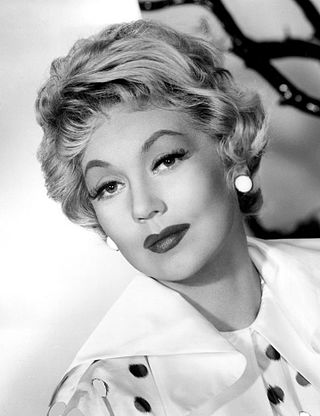
Ann Sothern was an American actress who worked on stage, radio, film, and television, in a career that spanned nearly six decades. Sothern began her career in the late 1920s in bit parts in films. In 1930, she made her Broadway stage debut and soon worked her way up to starring roles. In 1939, MGM cast her as Maisie Ravier, a brash yet lovable Brooklyn showgirl. The character proved to be popular and spawned a successful film series and a network radio series.

Angela Maxine O'Brien is an American actress. Beginning a prolific career in feature films for Metro-Goldwyn-Mayer at age four, O'Brien became one of the most popular child stars in cinema history and was honored with a Juvenile Academy Award as the outstanding child actress of 1944. In her later career, she has appeared on television, on stage, and in supporting film roles.
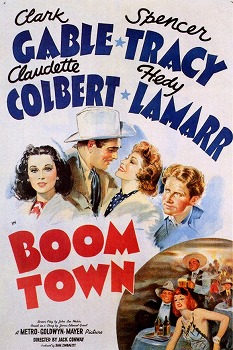
Boom Town is a 1940 American Western film starring Clark Gable, Spencer Tracy, Claudette Colbert, and Hedy Lamarr, and directed by Jack Conway. The supporting cast features Frank Morgan, Lionel Atwill, and Chill Wills. A story written by James Edward Grant in Cosmopolitan magazine entitled "A Lady Comes to Burkburnett" provided the inspiration for the film. The film was produced and released by Metro-Goldwyn-Mayer.
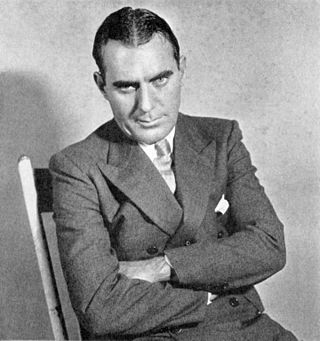
William Joseph Patrick O'Brien was an American film actor with more than 100 screen credits. Of Irish descent, he often played Irish and Irish-American characters and was referred to as "Hollywood's Irishman in Residence" in the press. One of the best-known screen actors of the 1930s and 1940s, he played priests, cops, military figures, pilots, and reporters. He is especially well-remembered for his roles in Knute Rockne, All American (1940), Angels with Dirty Faces (1938), and Some Like It Hot (1959). He was frequently paired onscreen with Hollywood star James Cagney. O'Brien also appeared on stage and television.

That's Entertainment, Part II is a 1976 American compilation film released by Metro-Goldwyn-Mayer and a sequel to That's Entertainment! (1974). Like the previous film, That's Entertainment, Part II was a retrospective of famous films released by MGM from the 1930s to the 1950s. Some posters for the film use Part 2 rather than Part II in the title.

Thousands Cheer is a 1943 American musical comedy film directed by George Sidney and released by Metro-Goldwyn-Mayer. Produced during the Second World War, the film was intended as a morale booster for American troops and their families.
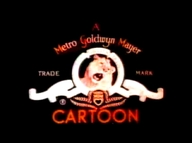
MGM Animation/Visual Arts was an American animation studio established in 1962 by animation director/producer Chuck Jones, producer Les Goldman and executive Walter Bien as Sib Tower 12 Productions. Its productions include the last series of Tom and Jerry theatrical shorts, the TV specials Horton Hears a Who! and How the Grinch Stole Christmas!, and the feature film The Phantom Tollbooth, all released by Metro-Goldwyn-Mayer.

Robert Sterling was an American actor. He was best known for starring in the television series Topper (1953–1955).

The Show of Shows is a 1929 American pre-Code musical revue film directed by John G. Adolfi and distributed by Warner Bros. The all-talking Vitaphone production cost almost $800,000 and was shot almost entirely in Technicolor.

Lady Be Good is an American musical film directed by Norman Z. McLeod and starring Eleanor Powell, Ann Sothern, Robert Young, Lionel Barrymore, and Red Skelton. It was made by Metro-Goldwyn-Mayer and produced by Arthur Freed. This was the first of several films Powell made with Skelton. Powell received top billing, but Sothern and Young are the main stars. They play, respectively, Dixie Donegan, a would-be lyricist, and Eddie Crane, a struggling composer.
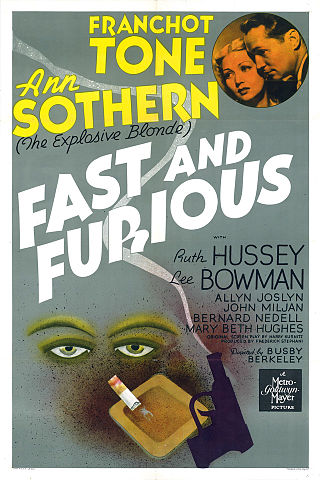
Fast and Furious is a 1939 American mystery comedy film directed by Busby Berkeley. The film stars Franchot Tone and Ann Sothern as Joel and Garda Sloane, a crime-solving married couple who are also rare book dealers. It is the last of a Metro-Goldwyn-Mayer trilogy, along with Fast Company (1938) and Fast and Loose (1939). However, different actors played the couple each time.

So This Is Marriage is a lost 1924 American silent drama film directed by Hobart Henley. The film was originally released with sequences filmed in the Technicolor 2-color process that depicted the story of David and Bathsheba from the Book of Samuel.

Du Barry Was a Lady is a 1943 American musical comedy film directed by Roy Del Ruth, starring Red Skelton, Lucille Ball, Gene Kelly, and Tommy Dorsey and His Orchestra. It is based on the 1939 stage musical of the same name. Shot in Technicolor, the film was produced and distributed by Metro-Goldwyn-Mayer.

Devil Dogs of the Air is a 1935 Warner Bros. film, directed by Lloyd Bacon and starring James Cagney and Pat O'Brien, playing similar roles as close friends after making their debut as a "buddy team" in Here Comes the Navy. Devil Dogs of the Air was the second of nine features that James Cagney and Pat O'Brien made together. The film's storyline was adapted from a novel by John Monk Saunders.
Little Johnny Jet is a 1953 Metro-Goldwyn-Mayer cartoon studio cartoon short directed by Tex Avery about a "family" of airplanes. The title is a play on Little Johnny Jones. The screenplay was written by Heck Allen. The film score was composed by Scott Bradley. The film was produced by Fred Quimby. It was nominated for the Academy Award for Best Animated Short Film but lost to the Tom and Jerry short Johann Mouse,.

Boy Meets Girl is a 1938 American screwball comedy film directed by Lloyd Bacon and starring James Cagney and Pat O'Brien. The supporting cast features Marie Wilson, Ralph Bellamy, Frank McHugh, Dick Foran and Ronald Reagan. The screenplay by Bella and Sam Spewack is based on their 1935 stage play of the same name, which ran for 669 performances on Broadway. The two zany screenwriters played by Cagney and O'Brien were based on Ben Hecht and Charles MacArthur, while Ralph Bellamy's part as the producer was based on Darryl Zanuck of 20th Century Fox.

Undercover Maisie is a 1947 American comedy film directed by Harry Beaumont and starring Ann Sothern, Barry Nelson, and Mark Daniels. It was produced by Metro-Goldwyn-Mayer, the final film of the ten film Maisie series starring Ann Sothern as ex-showgirl Maisie Ravier. In this series entry, Maisie Ravier decides to join the Los Angeles police force. The previous film was Up Goes Maisie.

Panama Hattie is a 1942 American film based upon the Broadway musical of the same name. It was produced by Arthur Freed and directed by Norman Z. McLeod.

Adrian Michael Morris was an American actor of stage and film, and a younger brother of Chester Morris.



















